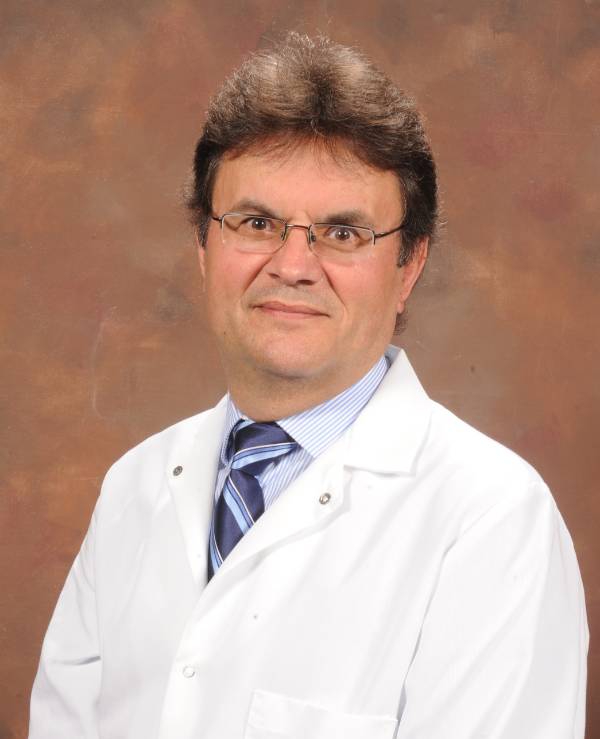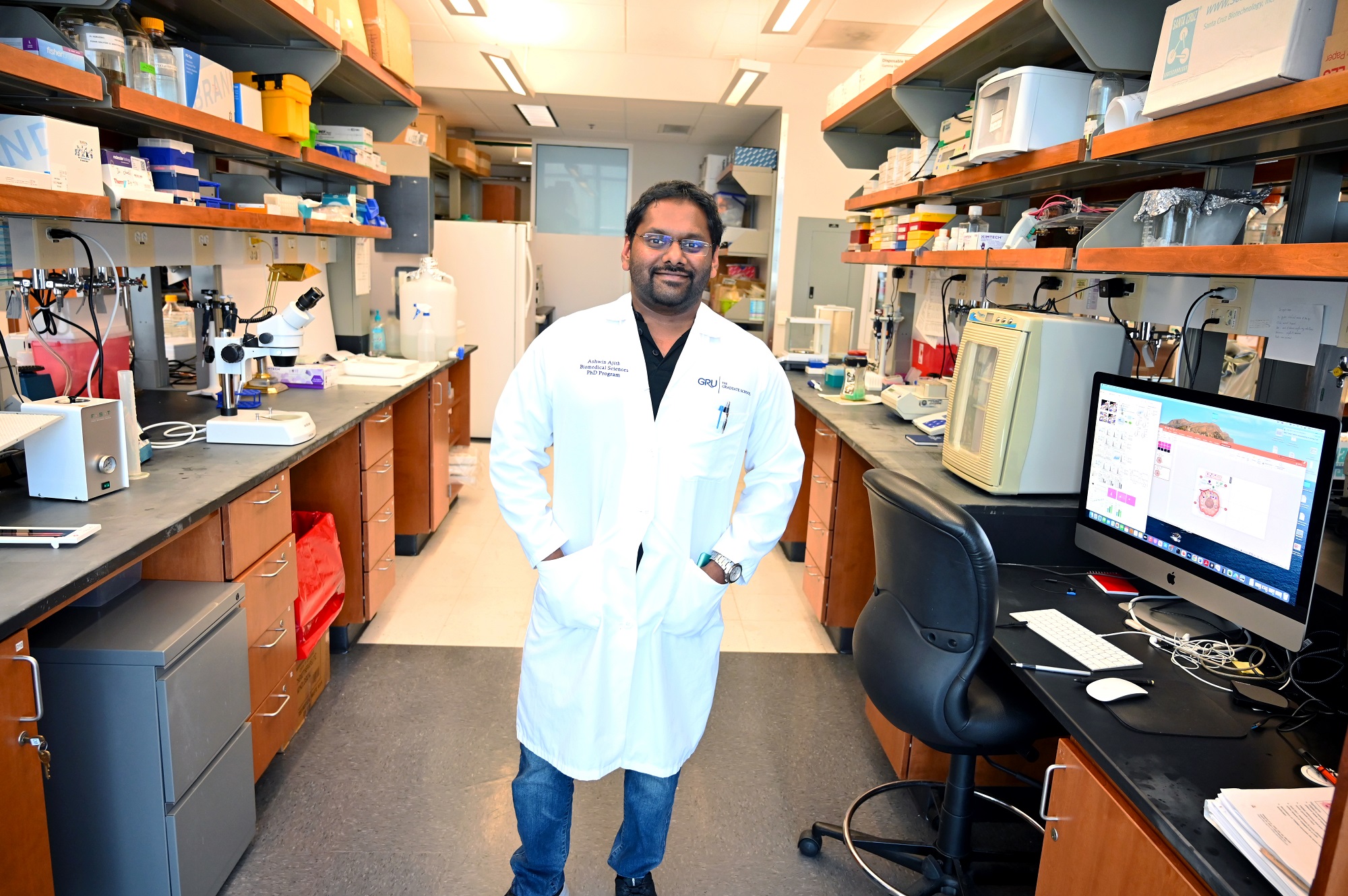
- Augusta University
- Georgia Cancer Center
- Research
- GCC Faculty Directory
- The Horuzsko Laboratory
The Horuzsko Laboratory

Anatolij Horuzsko, MD, PhD
Professor of Medicine
Professor of Biochemistry and Molecular Biology
Professor of Graduate Studies
Jump to: Research Summary Research Interests Selected Publications Research Team
Contact Us
The Anatolij Horuszko Lab
Health Sciences Campus
GCC - M. Bert Storey Research Building
1410 Laney Walker Blvd., CN-3125A1
(706) 721-8736
(706) 434-6447
Research Summary
Dr. Anatolij Horuzsko earned a degree in medicine from the Pediatric Medical School of St. Petersburg in 1976 and from Semmelweis University of Medicine in 1986. He received his PhD in clinical immunology and cancer biology from the Russian Academy of Sciences in 1980 and from the Hungarian Academy of Sciences in 1987 (Transplant Immunology). He continued his clinical training in pediatrics and hematology-oncology, completing postdoctoral fellowship at the National Institute of Hematology and Blood Transfusion of Budapest, Hungary and the National Institute for Medical Research, Mill Hill, London, UK. In 1995, he joined the faculty at the Medical College of Georgia, Augusta, GA, where he remains to this day. A teaching and research career in medicine, medical oncology and molecular immunology took him through the ranks of academia in Russia, Hungary, and the UK to the position that he currently holds as Professor of Medicine, Professor of Biochemistry and Molecular Biology, and Professor of Graduate Studies at the Georgia Cancer Center, Augusta University.
Research Interests
Inflammation is a characteristic feature of chronic liver injury. Chronic inflammation can promote all phases of carcinogenesis, from favoring the initial genetic alteration that gives rise to tumor cells, to acting as a tumor promoter by establishing an environment in the surrounding tissues that allows the tumor to progress and metastasize, to triggering immunosuppressive mechanisms that prevent an effective immune response against the tumor. Identifying new molecules that control inflammatory responses would provide a novel therapeutic possibility to prevent and reduce the incidence of cancer. Triggering receptor expressed on myeloid cell-1 (TREM-1) is one of these potential molecules. TREM-1 has limited expression; it is expressed on neutrophils, monocytes and macrophages and plays a crucial role in enhancing inflammatory responses through amplifying the expression of pro-inflammatory cytokines and chemokines. The causal contribution of TREM-1 in chronic inflammation and inflammation-associated cancer has not yet been established. Recently we have demonstrated that targeted deletion of TREM-1 significantly inhibits chemical-induced hepatocellular carcinoma (HCC) development. Our data demonstrate that liver injury is associated with enhanced expression of TREM-1 on Kupffer cells, in contrast to normal hepatocytes that are devoid of TREM-1 expression. In addition, TREM-1-deficient mice have significantly reduced recruitment of inflammatory cells to the liver and decreased levels of pro-inflammatory cytokines/chemokines, compared to wild-type mice. Ongoing studies are designed to understand the role of TREM-1 in induction of liver fibrosis and initiation and promotion of HCC. The laboratory is focused on the determination of cross-talk between hepatocytes, Kupffer cells, and hepatic stellate cells in the development of liver fibrosis and fibrosis-associated hepatocarcinogenesis.
The induction of immune tolerance continues to be an important goal of clinical organ and tissue transplantation. The immunological acceptance of a fetal semi-allograft during pregnancy is a natural model of immune tolerance, and its underlying mechanisms can be exploited to prevent allograft rejection in clinical transplantation. HLA-G is a human, non-classical MHC molecule expressed in immune-privileged sites and is responsible, in large part, for the development of maternal tolerance to genetically different fetal tissues. Evidence suggests that HLA-G protects the fetus from attack by natural killer cells, macrophages, dendritic cells (DCs), monocytes, and T cells by interacting with inhibitory receptors, such as immunoglobulin-like transcript 2 (ILT2) and ILT4, and modifying cell functions. The unique characteristics of both cell-surface and soluble isoforms of HLA-G, the formation of disulfide-bonded dimers with the potential to augment inhibitory receptor signaling, and the function of HLA-G as a preferential ligand for the ILTs make HLA-G very important in fundamental approaches for modulation of immune responses to improve allogeneic graft survival in clinical transplantation. We have developed models to dissect the mechanisms of tolerogenic function of HLA-G in vitro and in vivo. Our studies revealed that allogeneic skin graft survival is significantly prolonged or the allograft is accepted in transgenic mice expressing inhibitory receptors and treated with HLA-G1. Since HLA-G has the potential to up-regulate the expression of inhibitory receptors and HLA-G has been found in patients with organ transplants and might be associated with allograft survival, and because our data support that the HLA-G5 dimer form mediates the strongest inhibitory signal, we predict that the level of HLA-G5 dimer plays a critical role in patients in prolongation of kidney allograft survival. We propose that the different isoforms of HLA-G mediate distinct inhibition of immune responses via ILT receptors in patients with kidney transplants. We determined the levels and efficiency of inhibitory signaling of HLA-G5 monomers and dimers in patients with kidney allograft and the relationship between different isoforms of HLA-G and graft acceptance or failure. In addition, the interaction of a strong HLA-G ligand and ILTs promotes induction of regulatory T cells and myeloid-derived suppressor cells (MDSCs) with suppressive activity. We determined the expression of inhibitory receptors for HLA-G on immunocompetent cells, the development of regulatory cells and MDSCs in patients with kidney allograft, and the relationship between regulatory T cells, MDSCs, and graft acceptance or failure. Ongoing studies are designed to further understand the tolerogenic properties of HLA-G in humanized mice. Data generated from this model system will be used to optimize treatment in kidney transplant patients as a prelude to clinical trials in these patients.
Selected Publications
- Sreekumar A., Ajith A., Mamouni K., Horuzsko D.D., Horuzsko A. TREM1 is essential for maintaining stemness of liver cancer stem-like cells in hepatocellular carcinoma. Frontiers in Immunology, 16:1618342. doi: 10.3389/fimmu. 2025.1618342. PMID: 40677705.
- Xi C., Pang J., Xue W., Cui Y., Jiang N., Zhi W., Shi H., Horuzsko A., Pace B.S., Zhu X. Transsulfuration pathway activation attenuates oxidative stress and ferroptosis in sickle primary erythroblasts and transgenic mice. Communications Biology 8 (1), 15, 2025. PMID: 39762627.
- Xi C., Palani C., Takezaki M., Shi A., Horuzsko A., Pace B.S., Zhu X. Simvastatin-mediated Nrf2 activation induces fetal Hemoglobin and antioxidant enzyme expression to ameliorate the phenotype of sickle cell disease. Antioxidants, 13 (3), 337, 2024. PMID: 38539870.
- Ajith A., Mamouni K., Horuzsko D.D., Musa A., Dzutsev A., Fang J.F., Chadli A., Zhu X., Lebedyeva I., Trinchieri G., Horuzsko A. Targeting TREM1 augments antitumor T cell immunity by inhibiting myeloid-derived suppressor cells and restraining anti-PD-1resistance. Journal of Clinical Investigation, 133, e167951, 2023. PMID: 37651197.
- Xi C., Pang, J., Zhi, W., Chang, C.S., Siddaramappa, U., Shi, H., Horuzsko, A., Pace, B.S., Zhu, X. Nrf2 sensitizes ferroptosis through L-2-hydroxyglutarate-mediated chromatin modifications in sickle cell disease. Blood, 2023 Jun 2:blood.2022018159. doi: 10.1182/blood.2022018159. 2023. PMID: 37267508.
- Ajith A., Mulloy L.L., Musa A., Bravo-Egana V., Horuzsko D.D., Gani I., Horuzsko A. Humanized mouse model as a novel approach in assessment of human allogeneic responses in organ transplantation. Frontiers in Immunology, 12:687715. doi: 10.3389/fimmu. 2021.687715. PMID: 34177940.
- Ajith A., Portik-Dobos V., Nguyen-Lefebvre A.T., Callaway C., Horuzsko D.D., Kapoor R., Zayas C., Maenaka K., Mulloy L.L., Horuzsko A. HLA-G dimer targets Granzyme B pathway to prolong renal allograft survival. FASEB Journal, 33: 5220-5236, 2019. PMID: 30620626.
- Eisa N.H., Jilani Y., Kainth K., Redd P., Lu S., Bougrine O., Abdul S. H., Patwardhan C.A., Shull A., Shi H., Liu K., Elsherbiny N.M., Eissa L.A., El-Shishtawy M.M., Horuzsko A., Bollag R., Maihle N., Roig J., Korkaya H., Cowell J.K., Chadli A. The co-chaperone UNC45A is essential for the expression of mitotic kinase NEK7 and tumorigenesis. Journal of Biological Chemistry, 2019, 294: 5246-5260. PMID: 30737284.
- Nguyen-Lefebvre A.T., Ajith A., Portik-Dobos V., Horuzsko D.D., Arbab A.S., Dzutsev A., Sadek R., Trinchieri G., Horuzsko A. The innate immune receptor TREM-1 promotes liver injury and fibrosis. Journal of Clinical Investigation, 128: 4870-4883, 2018. PMID: 30137027.
- Nguyen-Lefebvre A.T., Horuzsko A. Kupffer cell metabolism and function. Journal of Enzymology and Metabolism, 1: 101-112, 2015. PMID: 26937490.
- LeMaoult J., Daouya M., Wu J., Loustau M., Horuzsko A., Carosella E.D. Synthetic HLA-G proteins for therapeutic use in cancer and transplantation. FASEB Journal, 29: 3643-3651, 2013. PMID: 23752205.
- Wu J., Li J., Salcedo R., Mivechi N.F., Trinchieri G., Horuzsko A. The Pro-inflammatory myeloid cell receptor Trem-1 controls Kupffer cell activation and development of hepatocellular carcinoma. Cancer Research, 72: 3977-3986, 2012. PMID: 22719066.
- HoWangYin K.Y., Loustau M., Wu J., Alegre E., Daouya M., Caumartin J., Sousa S., Horuzsko A., Carosella E.D., LeMaoult J. Multimeric structures of HLA-G isoforms function through differential binding to ILT receptors. Cell Mol Life Sci, 69: 4041-4049, 2012. PMID: 22802125.
- Liang S., Ristich V., Arase H., Dausset J., Carosella E.D., Horuzsko A. Modulation of dendritic cell differentiation by HLA-G and ILT4 requires the IL-6-STAT3 signaling pathway. Proceedings of the National Academy of Sciences USA, 105: 8357-8362, 2008. PMID: 18550825.
- Zhang W., Liang S., Wu J., Horuzsko A. ILT2 regulates the generation of myeloid suppressor cells and induces long-term survival of allografts. Transplantation, 86: 1125-1134, 2008. PMID: 18946352.
Research Team

Brooke Best
Reducing the Burden
The Georgia Cancer Center at Augusta University is dedicated to reducing the burden of cancer in Georgia and across the globe through superior care, innovation, and education. Through unprecedented expansion, the Georgia Cancer Center is providing access to more first-in-the-nation clinical trials, world-renowned experts and life-saving options.
Follow the Georgia Cancer Center